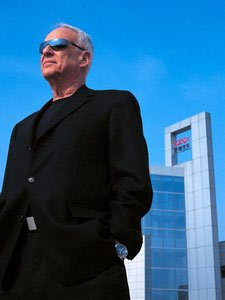The seemingly ever-present automotive entrepreneur, Malcolm Bricklin, is the latest and likely most well-known player to announce plans to enter the upcoming Automotive X-Prize. Bricklin says he's confident he will win the $10 million award with a 100 mpg plug-in hybrid-electric vehicle his company, Visionary Vehicles, is now developing.
The unusual pairing could help focus attention on the latest X Prize, an award originally created to spur commercial, manned space flight. In October 2004, a team led by aviation pioneer Burt Rutan captured the prize with the successful launch of SpaceShipOne. Now, a new Automotive X Prize is being launched, with the goal of creating "production-capable vehicles" that can deliver 100 miles per gallon.
"We have had the same basic automobile for decades. It's time for something new," explained Peter Diamandis, X Prize chairman.
And that's something the ever-optimistic Bricklin believes he can deliver. The long-time automotive maverick has been involved in a variety of start-ups over the years, some successful - such as Subaru of America - some not, including his eponymous Bricklin car and an aborted effort to import cars from China.
Now Bricklin has jumped onto the fast-emerging plug-in hybrid concept. The technology is similar to existing hybrid systems, such as that used in Toyota's popular Prius. But there are also significant differences.
Where Prius can run on either its electric motor, its internal combustion engine, or both, a plug-in's wheels would be driven by electric power alone. And instead of a small battery pack that is charged up by energy recaptured during braking and coasting, a PHEV's larger, advanced lithium-ion batteries can also be plugged into an AC outlet. That would, in Bricklin's planned vehicle, provide 40 to 50 miles range. Should a motorist travel further, a small, likely 3-cylinder, engine would start up, acting as an onboard generator.
So, unlike a pure electric vehicle, the entrepreneur explained, during a Thursday morning news conference, the vehicle would have "no limitations in range," but by using wall current and energy recaptured through regenerative braking, "you can get in excess of 100 miles per gallon."
What is likely to prove even more compelling is Bricklin's anticipated price tag. He hinted that the plug-in would be "as long as" a Mercedes-Benz S-Class, with good performance and a notably upscale interior, yet come in at no more than $35,000. That number is likely to generate a fair amount of skepticism, considering the high cost of lithium-ion technology. Indeed, most automakers are hedging their plug-in hybrid bets as it is still not clear how soon the technology will be ready in a form capable of withstanding the harsh automotive environment.
Yet Bricklin insisted he will have the first running prototype ready by sometime in 2008, with production planned by 2010.
Of course, it will help for Bricklin to work out some key details before then - like who will build his hybrid, and where. His initial intent was to go to China. Indeed, Visionary Vehicles was originally formed to serve as partner and American importer for products developed with the Chinese maker, Chery Automotive. That deal fell through, last year, and Chery has since signed on with Chrysler.
(During the Thursday new conference, Bricklin briefly suggested that there may be "legal ramifications" to follow from the collapse of the Chery deal, and Chrysler's involvement with the Asian maker.)
Bricklin is talking with a number of potential manufacturers, including several in China, though he admitted that the rising number of recalls of Chinese-made goods "scares me, too," and could leave U.S. buyers reluctant to buy cars imported from that country. So he's looking at sources "in a number of countries," including the U.S., "which would be my ideal."
Following the success of the original award, the X Prize Foundation has expanded its goals. It offered $10 million for genome sequencing, and is now hoping to spur developments in a wide range of fields, from automotive to underwater exploration.
"We're becoming risk-averse as a nation, but without risk you can't have breakthroughs.".

